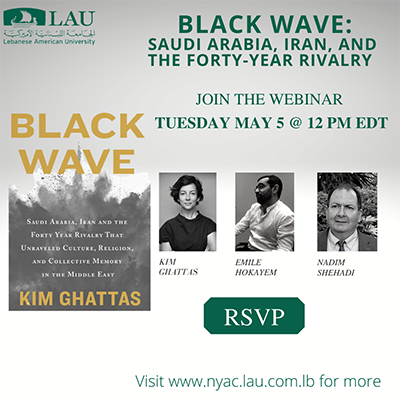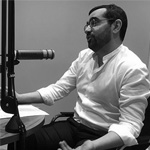Black Wave: Saudi Arabia, Iran, and the Forty-Year Rivalry
May 5, 2020
NYAC Online
Best-selling author Kim Ghattas in conversation with Emile Hokayem and Nadim Shehadi.
About this Event
In Black Wave, Emmy winning journalist and best-selling author Kim Ghattas tells how the modern Middle East fell into chaos and horror, starting with the pivotal year of 1979 and the bitter rivalry between Saudi Arabia and Iran. From Syria to Egypt, Lebanon, Iraq, Pakistan, Yemen and beyond, the ripples of the rivalry reengineered vibrant, pluralistic countries and unleashed sectarian identities and vicious violence that had never defined these societies in the past. The book brings to life not only the major figures who advanced the intellectual and cultural darkness that slowly engulfed the Middle East after 1979, but the vivid story of the many people who fought and continue to fight against it.
Joining Ghattas (Nonresident Senior Fellow, Carnegie Endowment for International Peace) are Emile Hokayem (Senior Fellow for Middle East Security, International Institute for Strategic Studies) and Nadim Shehadi (Executive Director, Lebanese American University New York).

RSVP
Speaker bios

Kim Ghattas is an Emmy-award winning journalist and writer who covered the Middle East for twenty years for the BBC and the Financial Times. She has also reported on the U.S State Department and American politics, and is the author of The Secretary: A Journey with Hillary Clinton from Beirut to the Heart of American Power. She has been published in The Atlantic, the Washington Post, and Foreign Policy and is currently a non-resident scholar at the Carnegie Endowment for International Peace in Washington. Born and raised in Lebanon, she now lives between Beirut and Washington, D.C.

Emile Hokayem, Senior Fellow for Middle East Security at the International Institute for Strategic Studies (IISS), specializes in political and conflict analysis, including the wars in Syria, Iraq and Yemen; relations between Iran and its Arab neighbors; the rise of non-state actors, including jihadi groups and Hezbollah; national security and defense policy in the Arab states; and the interests and involvement of external actors in the Middle East. Emile joined the IISS in 2010. Before that, he worked as the political editor and international affairs columnist at The National in Abu Dhabi and from 2004 to 2008 as the Research Fellow for the Middle East at The Stimson Center in Washington DC. He regularly provides analysis on Middle East affairs to governments, corporations and the media. His commentary has featured in the New York Times, the Financial Times, The Economist, Al-Hayat, Asharq Al-Awsat, Foreign Policy, LeMonde, the Wall Street Journal, the Washington Post, the BBC, NPR and other outlets.

Nadim Shehadi, Executive Director of the LAU New York Headquarters and Academic Center, is an Associate Fellow of the Middle East and North Africa Programme at Chatham House in London. He was previously the director of the Fares Center for Eastern Mediterranean Studies at The Fletcher School of Law and Diplomacy, Tufts University. He was also a senior member of St. Antony’s College Oxford where he directed the Centre for Lebanese Studies from 1986 to 2005. Shehadi trained as an economist with an interest in the history of economic thought.
